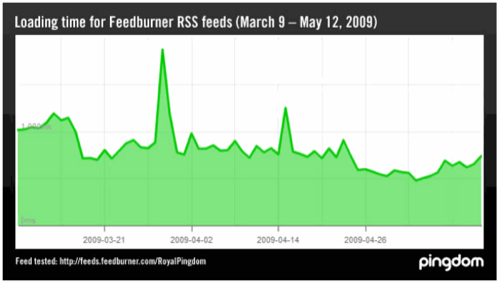According to a new report from website monitoring service Pingdom, Feedburner had an uptime of 99.94% over the last two months. Feedburner, which a lot of publishers use to manage their feeds and get usage statistics, was acquired by Google in 2007, and even though Google has kept the service running, a lot of users have been unhappy with various aspects of the service. With a 99.94% uptime, though, there is good evidence that the core function of the service, making feeds available, stands on solid ground – which, of course, we would expect from a service that runs on Google’s servers.

According to Pingdom, most of the outages were very short, with the longest lasting just 13 minutes, and most lasting just around a minute (Pingdom checked its feed once a minute for this report).
Pingdom also reports that the average loading time for the Pingdom feed was about 0.8 seconds, which has gradually improved since March. Overall, this number might be a good indication for the health of the Feedburner service, but for most users, 0.8 seconds will probably mean very little, as it often takes Feedburner 15 minutes or more to even update a feed with a new post.

The Feedburner service has definitely had its fair share of problems, including major issues with the stats it reports, but uptime was never really Feedburner’s most pressing problem. On our personal blogs and here at RWW, we have often seen that Feedburner would not respond to pings or took far too long to update our feeds.
While we have seen a few startups in this space, including FeedBlitz and Feedsqueezer, for most bloggers Feedburner is still the de-facto standard for managing their RSS feeds. And while it is nice to see that Google is doing a good job at keeping it up and running, it would be nice to see some general fine-tuning of the service. Even Google is now getting into the real-time web, and RSS feeds, which used to feel like a very speedy and efficient way to subscribe to information, but now are starting to feel rather slow.

















